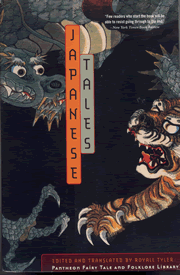
May Issue
June Issue
July Issue
Japanese
Tales
Royall Tyler (trans/ed)
Rating:
![]()
Royall Tyler's thick collection focuses on quantity and entertainment value. His liberal changes to the stories (best seen in a tale Donald Keene had already translated in his Anthology of Japanese Literature) make for interesting reading though many would doubt the accuracy of his translations. Many of the stories are also cut down to size.
Still, Mr. Tyler does Japanese literature readers service by providing selections that are rare and inaccessible. In fact, the bulk of his 250 tales cannot be found in Davis' Myths and Legends of Japan, In Ghostly Japan, Kwaidan, Romances of Old Japan, Tales of Old Japan or any of the collections I've read so far.
The stories are classified according to theme, allowing readers to perceive different facets about a particular creature, place, event or phenomenon. The stories are quite enetertaining and varied, most especially stories that have a little sexual content in them. Previous collections I've read often gloss over the titillating details or revise them to a PG13 rating. Thankfully, Tyler is gleefully straightforward when dealing with these themes.
A predominant amount of stories deal with monks though Tyler qualifies in his introduction that the original tales specify many types of monks and ascetics though he categorizes them as one group. The book is quick to both praise and ridicule monks. Their adventures, whether ignoble are admirable, are chronicled in a tongue-in-cheek manner with very sarcastic endings. Doubtless some of them were written this way though I'm sure Tyler may have had a direct hand in some of the language purely for the sake of a few laughs. Many of the selections protray monks and holy men as fallible humans who are stupid, ignorant, lazy and depraved. This is a welcome change to E.T.C. Werner's tales which narrates accounts of superhumanly holy monks.
Japanese Tales is entertaining and is an indispensable part of any Japanese Library simply because it contains English translations of inaccessible books like Hosshinshu (Those Who Awake to Faith), Jikkinsho (Ten Moral Teachings), Kokochomonju (Things Seen and Heard, Old and New), Konjaku Monogotarishu (Tales of Times Now Past), and Uji shui monogotari (A Collection of Uji Tales).The sheer number of works it represents makes it a praiseworthy paperback.

Japanese Tales
Royall Tyler (trans/ed)
Pantheon Books
 |
 |
 |
 |
 |